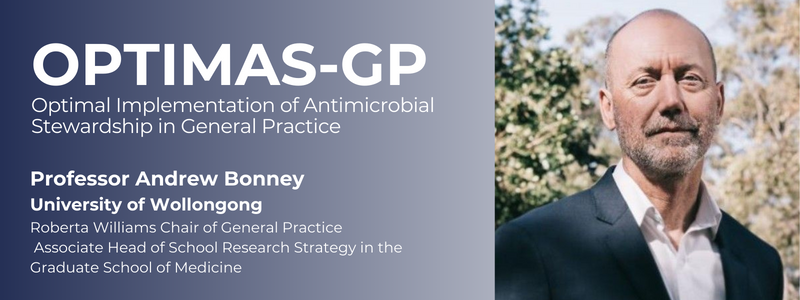Medcast Partners with the University of Wollongong to Combat Antimicrobial Resistance
As part of our continued success in supporting universities in pursuit of Medical Research Future Fund (MRFF) grants, Medcast is thrilled to announce a new collaboration with the University of Wollongong’s Graduate School of Medicine. Led by Professor Andrew Bonney, who has been awarded a $2.7 million MRFF grant, this research initiative aims to address antimicrobial resistance (AMR) in general practice.
The OPTIMAS-GP Study
The study, titled "Optimal Implementation of Antimicrobial Stewardship in General Practice" (OPTIMAS-GP), focuses on reducing the inappropriate prescription of antibiotics, a key factor in the development of AMR. General practitioners (GPs), often the first point of contact for patients with respiratory infections, play a vital role in this effort.
Professor Bonney
Professor Bonney’s team, which includes Medcast’s A/Prof Stephen Barnett and researchers from Bond University, Monash University, and the University of Tasmania, aims to enhance GPs' capabilities through the development of an innovative online Antimicrobial Stewardship (AMS) Toolbox. This tool is designed to support GPs in their consultations with adult patients experiencing acute respiratory infections.
Role of Medcast
Medcast is poised to make a significant contribution to the OPTIMAS-GP study by leveraging our expertise in online learning for GPs and educational technology. Our role will include:
-
Developing and Hosting Online Educational Content: We will assist in creating and disseminating the educational components of the AMS Toolbox.
-
Supporting the Randomized Controlled Trial (RCT): We will implement two evidence-based online education and audit strategies—one self-paced and the other facilitated—to determine which is more effective at improving GP practices and reducing unnecessary antibiotic prescriptions.
Why This Matters
The threat of AMR cannot be overstated—without effective antibiotics, routine infections could become more dangerous, leading to increased mortality and economic burden. By improving antibiotic prescribing practices, we can significantly reduce the risk of bacteria developing resistance.
We are excited about the potential of this partnership to transform healthcare practice and look forward to sharing updates as the project progresses.


Stephen is a GP Supervisor, Medical Educator, GP academic and Medical Director of Medcast. He has completed a PhD on Virtual Communities of Practice in GP Training.
Become a member and get unlimited access to 100s of hours of premium education.
Learn moreMyMedicare is now part of routine general practice, with practical implications for billing, continuity of care, and practice systems. This FastTrack clarifies important points regarding eligibility, impacts on the GPCCMP billing, and how to avoid rejected claims. 30mins each RP and EA available.
Many GPs may not see veterans frequently. This FastTrack provides a summary of key steps that can make veteran care efficient, rewarding and well-integrated into routine practice, including links to additional resources. 30mins each of RP and EA are available.
From the 1st Nov 2025, updates to the MBS affect all GPs providing services related to long-acting reversible contraceptives. This FastTrack will get you up to date on which items attracted an increased rebate, the new item number, and how to avoid common compliance pitfalls. 30mins each of RP and EA CPD available with the quiz.
